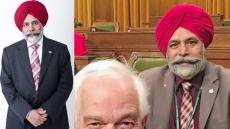OTTAWA — The notion of a pan-Canadian corridor dedicated to rail, power lines and pipelines has been around for at least half a century but it looks like it's about to get a big publicity boost.
Last week, Conservative Leader Andrew Scheer used a major pre-election policy speech to dust off a similar idea. Scheer promised, if he wins October's election, that he would to work towards establishing a cross-country "energy corridor."
He said planning for the route would be done up front, in consultation with provinces and Indigenous communities. A right-of-way would make it easier to lower environmental assessment costs, improve certainty for investors and increase the chances more projects will be built, Scheer said.
Interest in a coast-to-coast corridor has picked up in recent years. Energy infrastructure proposals have failed to secure approval due to tough regulatory processes and community concerns over environmental impacts.
For instance, the shortage of pipeline capacity out of oil-rich Alberta has created a bottleneck that's harmed both the provincial and national economies. Sellers have had to sell at deep discounts because there simply isn't the transportation capacity to get oil to willing buyers.
In the last few years, a few academics and senators have recommended the federal government give the corridor concept a serious look, even though making it happen would be a big, multi-jurisdictional undertaking.
Scheer's pitch appears to have drawn inspiration from a 2016 University of Calgary paper that offered possible solutions through a northern corridor for transportation and infrastructure.
G. Kent Fellows, who co-authored the report, said the right-of-way could be used for roads, rail, pipelines, electricity transmission lines and telecommunications. The study's proposed 7,000-kilometre corridor would also serve communities well north of the existing east-west routes that run closer to the U.S. border. In concept, a main line and offshoots would connect ports in northern British Columbia and the Northwest Territories to Churchill, Man., eastern Quebec and Labrador.
The hurdles of consultations and regulatory oversight for new projects are significant, Fellows said.
"Those regulations are definitely there for a reason, but we were trying to come up with a better model," he said.
Dedicated infrastructure corridors have had success in other jurisdictions, including Europe and Australia, Fellows said.
Pipelines are very good at generating economic benefits at both ends of the line, and not so much in the middle — but roads, rail, electricity and telecom can help people all along the route, Fellows said.
"You might not make everyone 100-per-cent happy, but the goal is to try to make everyone a little bit happier than they are now," said Fellows, who co-wrote the paper with Andrei Sulzenko.
The creation of a corridor could take decades, or even half a century, and a "back of the envelope" calculation estimates it could cost something like $100 billion, Fellows said.
The study caught the attention of a Senate committee, which took a closer look at the concept in 2016 and 2017.
In a 2017 report of its own, the committee called the corridor idea a "visionary, future-oriented infrastructure initiative" that would create significant economic opportunities for Canada and help develop northern regions.
"Because an initiative of this scale and scope would likely take decades to complete, the federal government — on a priority basis — should ensure that a feasibility study on the proposed northern corridor is undertaken," said the committee report.
Senators recommended the government dedicate up to $5 million to the University of Calgary to support further research into the corridor.
The committee report noted how a 1971 report by Richard Rohmer — an air-force veteran of D-Day who became a prominent land-use lawyer with the ear of governor general Roland Michener — proposed the development of a "mid-Canada" corridor, recommending federal, provincial and territorial governments make it an urgent priority. Rohmer imagined a massive transportation network for goods and people could turn communities such as Flin Flon, Whitehorse and High Level into major new urban centres.
The report was presented then-prime minister Pierre Trudeau but the committee said his government never moved forward on the idea.
Christopher Ragan, a McGill University professor, said he recalls the University of Calgary corridor study and he thinks it's "quite a striking idea" that makes a lot of sense.
Ragan, who served on federal Finance Minister Bill Morneau's economic advisory panel, said he's glad Scheer has taken up the concept of a corridor and bringing it to the public's attention as a serious idea.
On climate change, Ragan said the country will want to find ways to get through tough approval processes to run more east-west energy grids. For example, he said clean electricity could move from British Columbia, Quebec and Manitoba into Alberta, Saskatchewan and parts of Ontario to help displace fossil-fuel generation.
Ragan is also head of the Ecofiscal Commission, a group of academics focused on economic and environmental solutions.
"I don't frankly care whether it's an old idea or a new idea — but it is a new idea in terms of a real-world, policy practical discussion ... It's good that you actually have politicians starting to talk about this."


